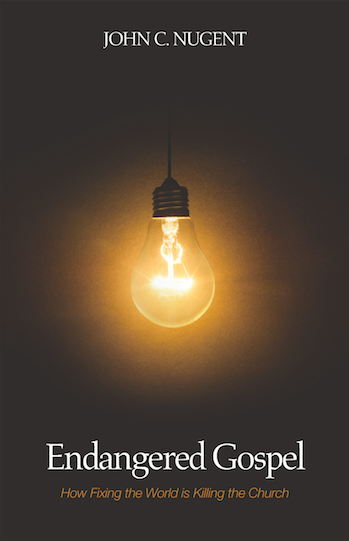 One of the themes in John Nugent’s excellent book The Endangered Gospel is that the church is not called to make the world the better place but to be the better place now.
One of the themes in John Nugent’s excellent book The Endangered Gospel is that the church is not called to make the world the better place but to be the better place now.
Does such a view promote quietism, passivism (socially) and does it mean social justice doesn’t matter?
Good question. The answer is No, unequivocally. I have argued this in Kingdom Conspiracy and it all revolves around mission — the Christian mission. Nugent examines three topics: vocation, missions, and witness to the powers. Today we look at witness to the powers.
Who are the powers?
… governing institutions that God uses to maintain order in society by keeping evil under control and promoting the well-being of those in their charge. The powers most talked about in Scripture include angels, governors, religious authorities, masters, and parents. In our day, this list needs to be expanded. It now includes universities, utility companies, economic structures, multinational corporations, the Internet, the entertainment industry, and news outlets. 182
The state stands in a particular sort of relation to heaven-centered and world-centered approaches to a better place. Since the heaven-centered approach is most concerned with rescuing people from this world and preparing them for the next one, it can be quite indifferent to the state.
Because the state possesses more power for social change than any other institution, the world-centered approach cannot be indifferent to it. It is either too valuable an ally or too powerful an opponent to ignore. In many regards, the state and the world-centered church want the same thing. They want to make the world a certain way. … The world-centered approach thus seeks to cooperate with the state in order to achieve common goals. 183
The kingdom-centered view is different. It calls for a unique relationship to the state. 184
The difference is that two dominions occupy the same planet in two very different ways. And God’s kingdom has already begun to supplant the state’s dominion.
God’s kingdom takes precedence over all other loyalties; the state asks for allegiance and a willingness to kill and die for it.
Nugent has 21 such point-counterpoint statements, then says this:
In light of these fundamental differences, Christians committed to embracing, displaying, and proclaiming God’s kingdom just wont be all that interested in joining the state’s efforts to improve this world. 185
In light of the important service the state renders on God’s behalf, the stark differences between Gods kingdom and the state lead Christians into a unique stance toward the state. Neither warm embrace, nor hostile resistance will do; instead, our mission requires us to maintain a stance of respectful disentanglement.
Levites could fulfill a chaplain-like function on behalf of other tribes only because they belonged to the same Lord and shared the same values. But that is not how Scripture portrays the church’s relationship to the world. God s people are set apart from world powers because they seek a different kingdom, follow a different Lord, and expect a different inheritance when Christ returns. 188
. Our priestly “irresponsibility” makes possible our priestly responsibility.
But this doesn’t mean quietism; no it is the mission of God to be for the world by being the church:
Since the mission of God’s people entails forming communities that embody Jesus’ alternative all-encompassing politics precisely for the worlds sake, then focusing on our mission is not lazy, unloving, irresponsible, or ungrateful. It is rightly ordered action, love, responsibility, and gratitude. Since it is God’s strategy for blessing all nations, it is the best way to preserve whatever is good and worth dying for in this world. Those who reject God’s strategy or merge it with the world’s strategies by making yet another pointless run at ruling like the nations are the ones who are acting irresponsibly. 189
Seven final points by Nugent:
- By being a better place, the church is a visible sign of God’s control of world history through Christ.
- By being a better place, the church reminds the state that it is not the only institution that commands loyalty.
- By being a better place, the church reminds the state that it is not God’s agent for saving this world, but for maintaining a basic level of order and seeking the good of its citizens.
- By being a better place, the church reminds the state that God cares about all people and not just those who live in their particular territory.
- By being a better place, the church reminds the state that God’s kingdom is the standard for all things, and that the way of Jesus is possible in world history.
- By being a better place, the church equips its members to live out the way of Christ in every aspect of their lives, whether at work, church, school, home, or in the marketplace.
- By being a better place, the church equips its members to honor state officials by praying for them and for all who are impacted by their policies.




